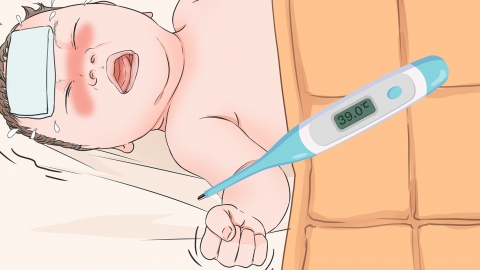What should I do if a one-month-old infant has a fever of 38°C?
Generally speaking, fever refers to an elevated body temperature. A fever of 38°C in a one-month-old infant may be caused by high environmental temperature, intense crying, bacterial enteritis, upper respiratory tract infection, neonatal pneumonia, or other reasons. Treatment options, under a doctor's guidance, may include general care and medication. If the infant's temperature continues to rise or is accompanied by other severe symptoms, prompt medical attention is necessary. Detailed analysis is as follows:

1. High Environmental Temperature
An infant's body temperature regulation center is not yet fully developed, and their subcutaneous fat is thin, resulting in poor heat dissipation. When the ambient temperature is high, such as during summer when air conditioning is not used indoors or the baby is over-wrapped, the infant's body heat cannot dissipate effectively, which may cause the body temperature to rise to 38°C. It is important to maintain a suitable indoor temperature, avoid over-wrapping the infant, and choose appropriate clothing and bedding according to room temperature to facilitate heat dissipation.
2. Intense Crying
When an infant cries intensely for a prolonged period, his or her metabolic rate increases, muscle activity intensifies, and heat production rises, which may temporarily elevate body temperature to 38°C. It is important to soothe the infant promptly, reduce the duration of crying, and calm the baby through feeding, gentle patting, or hugging to prevent abnormal temperature elevation caused by crying.
3. Upper Respiratory Tract Infection
Upper respiratory tract infections are usually caused by viral infections. An infant's respiratory mucosa is delicate and their immunity is low. After viral invasion and inflammation occurs, the immune system is stimulated, leading to elevated body temperature. Symptoms may include nasal congestion, runny nose, and sneezing. It is recommended to follow medical advice to use medications such as Pediatric Chuhiao Qingre Granules, Pediatric Chai Gui Antipyretic Granules, or Paracetamol Suspension Drops for treatment.
4. Bacterial Enteritis
Bacterial enteritis is generally caused by bacterial infection. Following intestinal bacterial infection, the body develops an inflammatory response, which causes elevated temperature and may also be accompanied by symptoms such as diarrhea and vomiting. Under a doctor's guidance, medications such as Cefixime Granules, Montmorillonite Powder, and Oral Rehydration Salts III may be used for treatment.
5. Neonatal Pneumonia
Neonatal pneumonia can be caused by bacterial or viral infections or by inhalation of amniotic fluid or meconium. When pathogens infect the lungs, inflammation develops, impairing the lungs' gas exchange function, and the body mounts an immune response, leading to fever. Common accompanying symptoms include rapid breathing, frothing at the mouth, and choking while feeding. It is recommended to use medications such as Cefaclor for Oral Suspension, Ambroxol Hydrochloride Oral Solution, or Budesonide Suspension for Inhalation under medical guidance to alleviate symptoms.
In daily life, it is important to keep the indoor air fresh and maintain suitable temperature and humidity. Wash hands before handling the infant to prevent the spread of pathogens.










